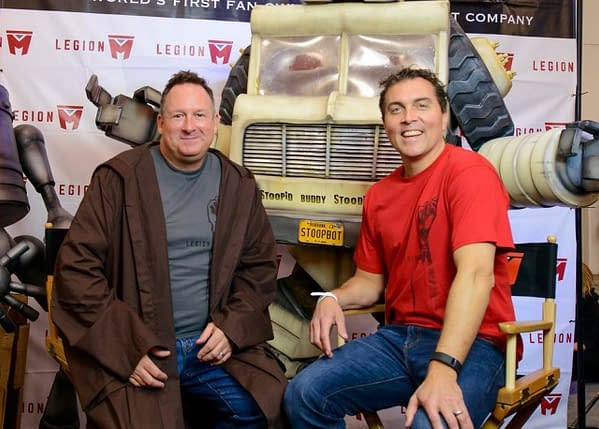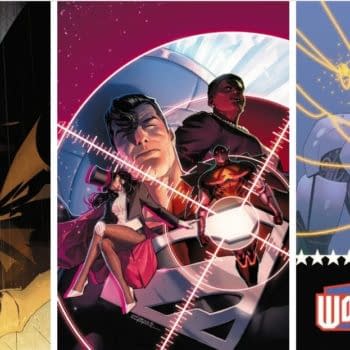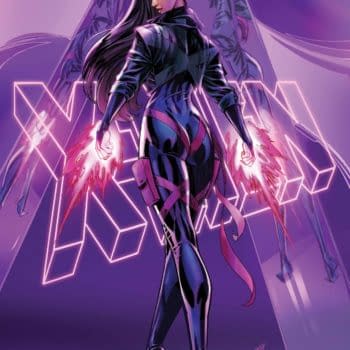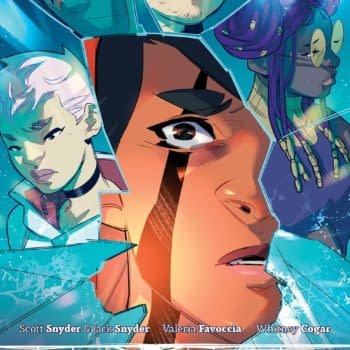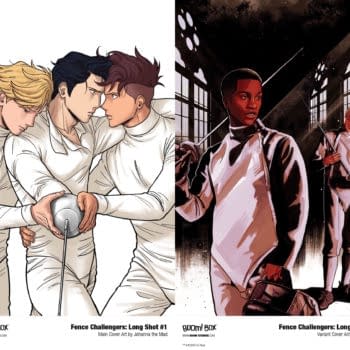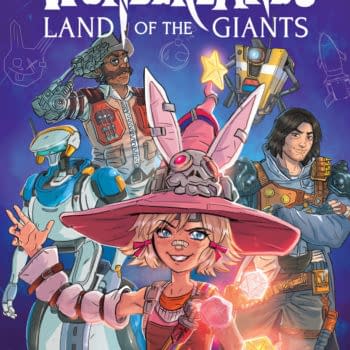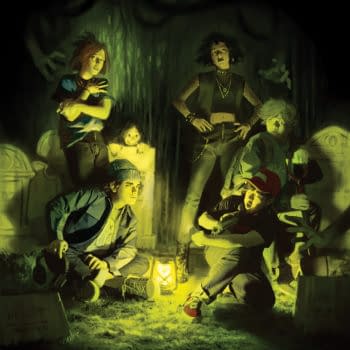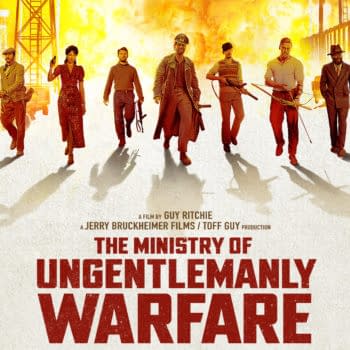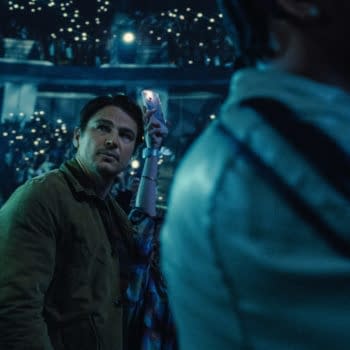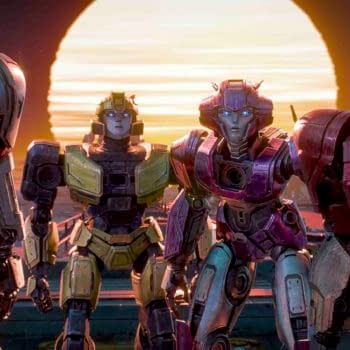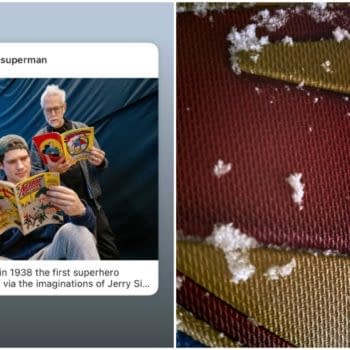Posted in: Movies | Tagged: Comics, entertainment
"The Number One Request That We Get Is Firefly" – Jeff Annison On Reviving The Classics With Legion M Studios
Jeff Annison is the co-founder, along with Paul Scanlan, of Legion M Studios, the world's first fan-owned production company. It did this when the SEC changed its rules to allow non-accredited investors to make investments in small businesses. It is the second company to raise $1 million this way. They are looking to open funding again in November 2016 under Reg. A+, which will allow a higher threshold of $50 mil. The company's ultimate goal is one million investors.
G: Lloyd Kaufman of Troma, when he talks about financing movies and getting them distributed and such, he always says, "There are no rules to this game." Are you finding this to be true or are you running into limitations for what you're trying to do with this company?
Annison: I'm new to the film distribution side and the economics and business models. But our last company that we founded, it was called MobiTV. We founded it in 1999, and in 2003, we were the first ones to launch live TV on your cell phone, which at the time, people said was stupid. Literally. Hollywood heads would say, "No one's ever going to watch a movie on their cell phone. It's the dumbest thing I've ever heard of."
G: If I'm remembering correctly, it was only up until relatively recently that Hollywood was still distributing film reels by railroad cars.
Annison: Yeah. So 2003, we were literally laughed out of Hollywood…for the most part. There were some people who were forward thinking and they got it. We launched the service, it took off like a skyrocket, and in 2005, we won an Emmy for innovation in television.
The reason I bring that up is, we firmly believe that there are no rules. Especially this day and age. If you go back twenty years ago, television, movies, music, everything was governed by these machines that were set up, and it was impossible to break through into the industry unless you were going through the label machine. With the Internet, it has disrupted everything. The fact that you can go direct to fans, now, suddenly, instead of a small handful of networks that control televison distribution, you have HBO and Hulu and Netflix and Crunchyroll and all of these amazing opportunities. And if you think about mobile, launching a deal with Vodaphone could be as big a deal as signing with ABC. Both of them have global reach and they're looking for content for the world. It's a wild West out there.
G: There are so many companies out there like Vudu and Hulu and Netflix and that, do you think we're reaching a saturation point? Are you afraid things are going to collapse in the middle of what you're working on?
Annison: I don't know that it's going to collapse. The fact is, it's all propped up by consumer demand. I don't feel like there's a whole bunch of companies out there that are, say, financed by venture capitalists and don't have an audience. What we're seeing is a fracturing of the audience, and we're seeing the long tail where a niche service like Crunchyroll can exist. It's profitable, it's making money, and there's space for probably a dozen Crunchyrolls out there. Honestly, I think we're in a golden age of entertainment because there's so many different opportunities, so many different ways to reach an audience. Particularly in television – you look at all the original storytelling is happening in television. Film is completely dominated right now by franchises and sequels and reboots. I read a really amazing article that said, if you go back ten or fifteen years ago and look at the top ten films, they were all original stories. You look at the top ten films of 2016, they're all sequels or reboots. It's incredible how Hollywood has changed. So I think that feature film and that model, I think that one is collapsing in on itself. My children are more likely to watch a movie on their cell phone than go into a theater. So I think if you look at theatrical distribution, I feel like that area is constricting. But it's constricting because it's been replaced by all of these new things and all of these new avenues.
G: What is the response from fans and other people so far? Are they excited about the idea? What are things looking like so far?
Annison: It is beyond our wildest dreams. Three months ago, we launched this Title 3 campaign. We were one of the first companies in history, on May 16th when the laws went into effect, to launch something like this. And as an artist, you know there's this wonderful point where the rubber meets the road – you put yourself out there for the first time, and now is the point where the public is going to weigh in and vote with their dollars and they're going to put their opinions out there and the trolls are going to come in and all of that stuff. Before that, you don't know. We think our baby is beautiful. In three months, we raised a million dollars. That was the cap, and we were oversubscribed – more wanted in than could get in. If you look at the chart of how people came in, we raised $200,000 our first month, second was $300,000, third month was $700,000, so it's literally exponential growth. Clearly, the fans have spoken with their dollars, that more people wanted in than we had room for. So I think that bodes really well for us. But what's even more rewarding for me as an entrepreneur is seeing the vibrancy and enthusiasm of the community. The whole reason we target the comic con community is because it's a creative community and it's a passionate community. If you're going to go after a group of fans, this is the best one to go after because it's such a fun group and a creative group and they're really passionate.
We have a private Facebook group, and if you join as an investor or even a free member (we're not raising money right now because our round is over), you get access to this group, and it's awesome. You get all these notes from people saying, "It's an honor to be a part of this," or "I've always loved Hollywood, and to be able to get this backstage pass…" It's been way beyond our greatest expectations.
G: Do you have anything in development yet?
Annison: …
G: Strike that…do you have anything YOU CAN TALK ABOUT in development yet?
Annison: (laughs) That's the key qualifier! We made our announcements about our first project with Stan Lee, a virtual reality interview. The whole idea behind it is we're using some really cool VR technology to do an intimate interview with Stan, where we can ask him questions. And the result is, when you put on the VR goggles, it's like you're in the room. We want to get you as close to humanly possible to being in the room with Stan Lee.
Other than that, we've got dozens of projects that are coming across the table. Especially now. We've got great partnerships with Stoopid Buddy Studios, Meltdown Comics, 42 Entertainment, Alamo Drafthouse – a really solid group of people that we can do projects with and can also help us navigate the art and the business of Hollywood. What we've found, now that we're out there and we've proved this model works (because three months ago it was just Paul and I jumping up and down saying, "Oh, this is a great idea!" Now, it's us and over three thousand fans jumping up and down and a record-breaking Title 3 campaign), what happens is, success kind of breeds success. Especially in Hollywood. So the offers and the projects that we're getting now are even higher. People are reaching out to us, we had a great profile in the LA Times, and Kerry O'Quinn, the founder of Starlog and Fangoria, read our profile and reached out to us. The guy who celebrated fandom and built a business around it.
G: Disney Interactive got folded recently, and people who worked there said the biggest problem was that Disney did not understand that, in the video game field, you have to go off the beaten path. Disney wanted something that worked a certain way and gave a certain return on investment. They were unfamiliar with the risk aspect of the business. Do you find that your business model is coming into conflict with traditional business models of, "No, this is the way we've always done it?"
Annison: You always face that. It's very difficult for a business like Disney to disrupt because they're the incumbent. From a strategic standpoint, it's why you need small start-up companies who have nothing to lose, because that's where innovation comes from. Disney could never do anything like what we're doing. But from what we've found so far, most companies are very receptive to it. We didn't know going in. We kept wondering, "Are people going to laugh us out of Hollywood?" But so far, the reception has been very positive. And I think it's because there's a lot of different ways we can work with people. And I think that what this company's recognized is the power of this legion of fans. Our logo is the Roman numeral for one million, because our goal is one million shareholders in our company. Because if you have one million fans behind you, there's nothing you can't do. Any movie you want to create, you can do it. Any property. Any game. Anything novel that's never been done before. If you've got a million people that are invested in it and following along and going, "This is amazing, I want to try it," you can do anything.
I think that most companies see the risk of what we're doing, but they also recognize the value of what we're doing. So they've been very receptive. "How can we partner together in a way that makes sense?"
G: Are you looking to revive classic geek franchises? DreamWorks has just revived Voltron, IDW is doing comics about Rom The Space Knight, are you looking around at some of the older stuff that's out there that never quite got a shot and thinking about maybe reviving it at some point?
Annison: We would love to do some projects like that. Keep in mind, we are looking at a slate of projects that will be changing over time. There's definitely room on our slate for that – the number one request that we get is Firefly. We would love to, and our investors would go ape if we could do that. The challenge with these old properties is the rights are so convoluted and there's personality issues and there's ego issues.
G: Like how you couldn't shoot The Expendables back in the 80's.
Annison: Exactly. So it's something we're always interested in, and there will always be room on our slate for projects like that, part of the power of the Legion is that we have the power to make things that are unique and original. Hollywood right now is so driven by all these remakes and sequels is because there's a fanbase built into it. And we believe we've got a fanbase built into our company. One of the things we want to do is use the Legion to find new properties, whether it's a book or a comic book or a YouTube creator or whatever. What is amazing out there that could be huge, and let's take that on. And because we've got this nucleus, this audience that's been invested since Day One, we've got a lot more ability to think outside the box and create original things.
G: With comics, movies, video games, which media are you finding the easiest to break into and which are the toughest to crack?
Annison: Well, I think every single one has different business models, from comic books to television to VR to games. They are all completely different business models and ecosystems and personalities involved. So I don't know if I'd say that one is more difficult, they're all just unique, and I think in ways that are interesting and exciting. And for people like Paul and I who are interested in technology and are by nature entrepreneurs, we love that fact. So at the end of the day, we want a wide slate. And part of that is diversifying across genres, and part of it is diversifying across media. And we're not developing these properties ourselves – we're not a studio that's hiring grips and cameramen and studio space and that sort of stuff. We're going to partner with Stoopid Buddy. We're partnering with film studios. And it makes it really fun because you can look at this stuff across media. If you are developing, say, a movie, you should say, "How would this play out in VR? Or as an iPhone game?"


